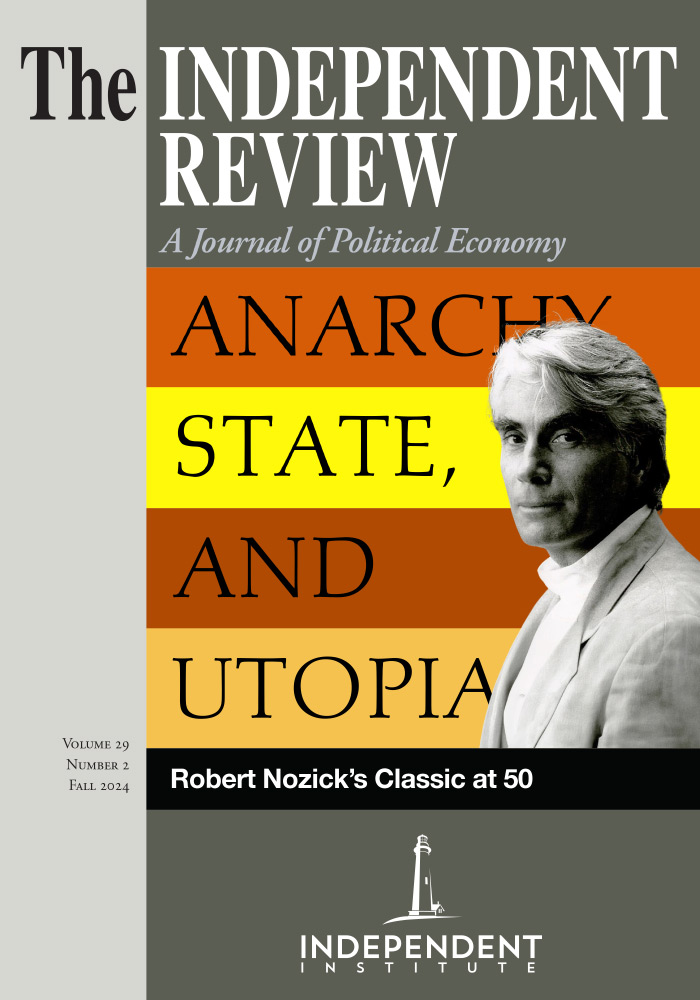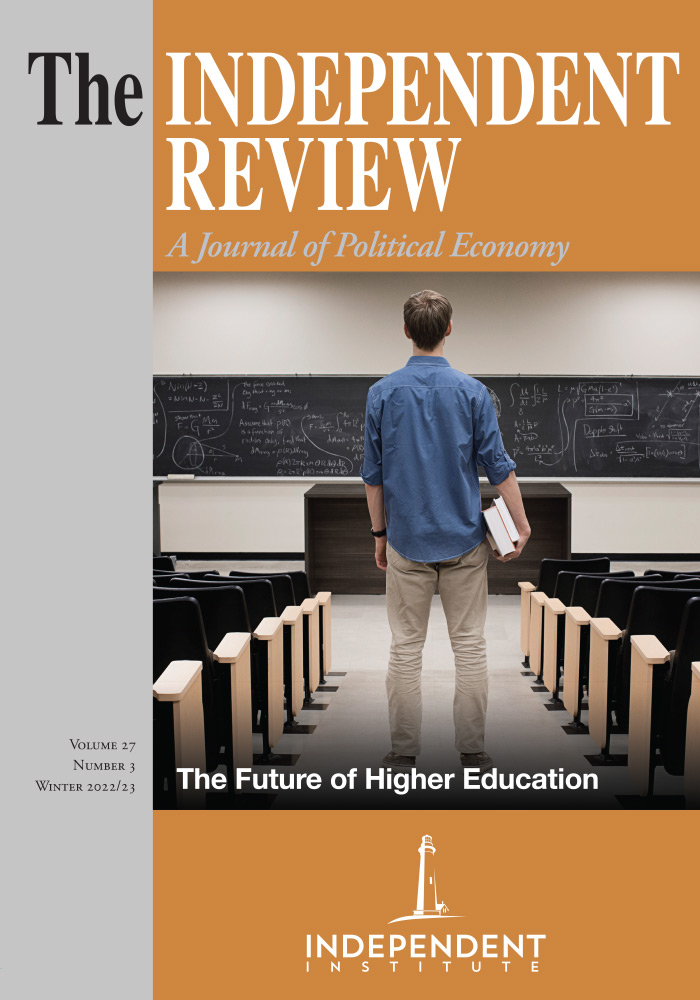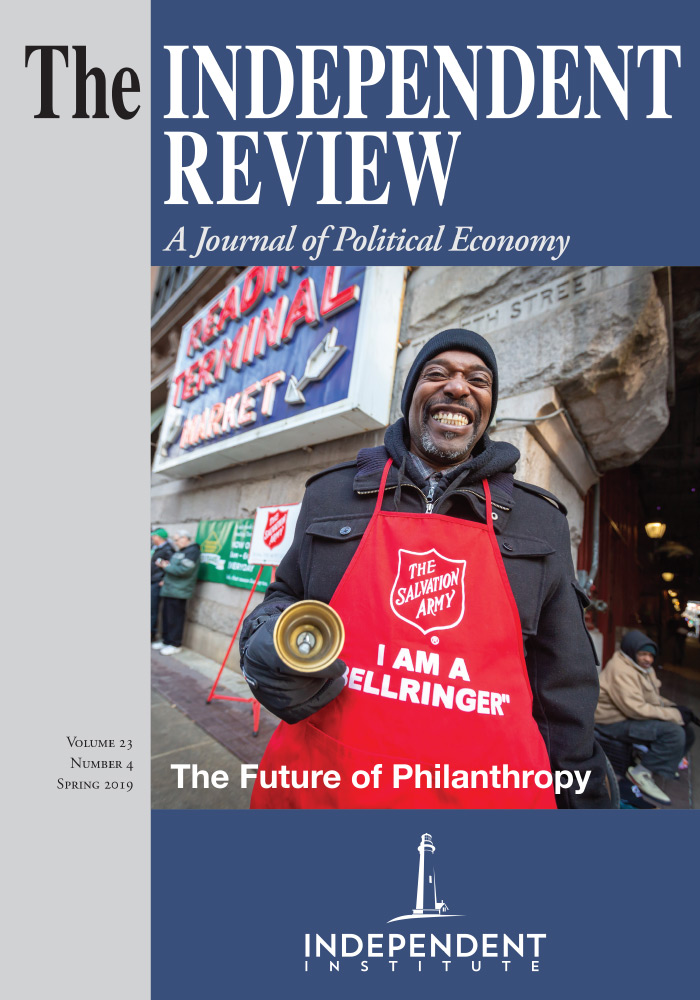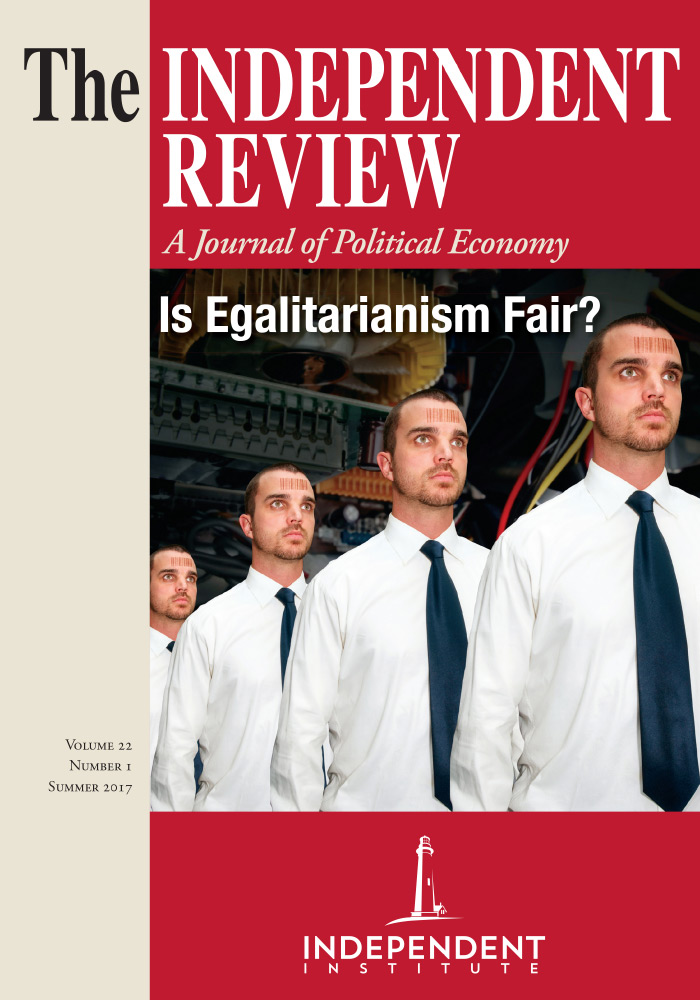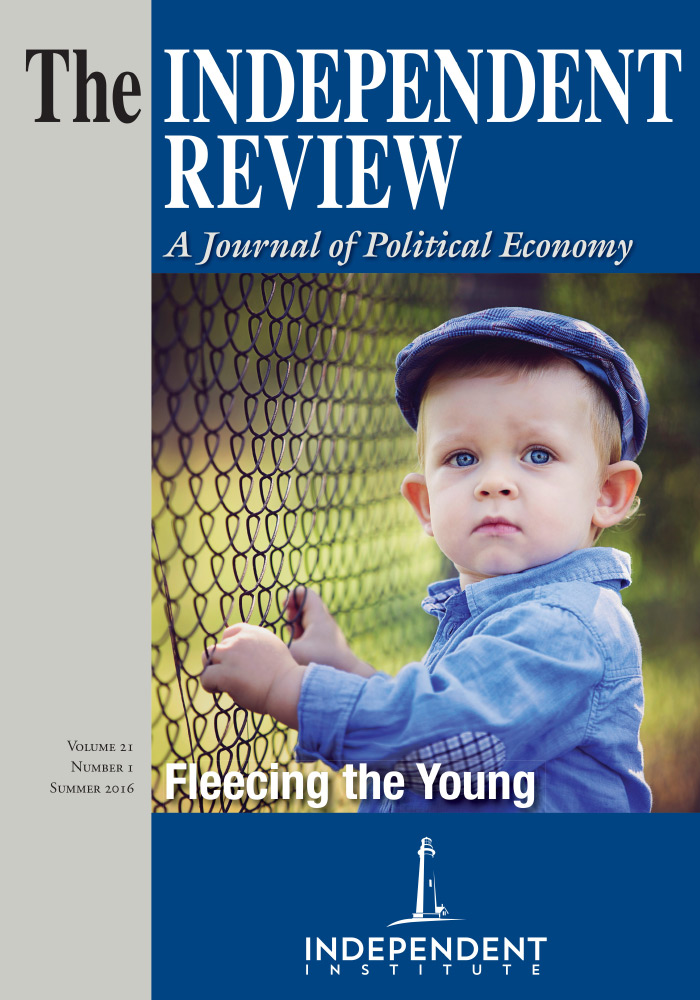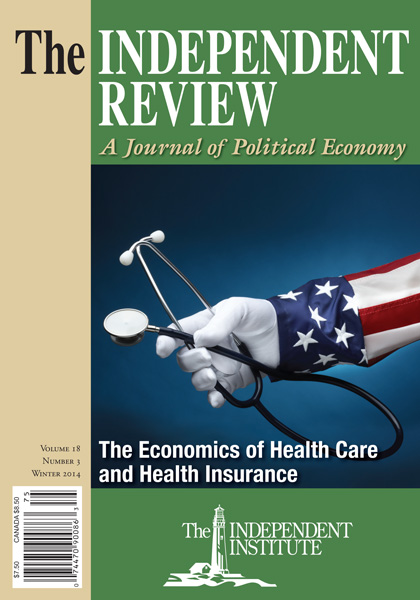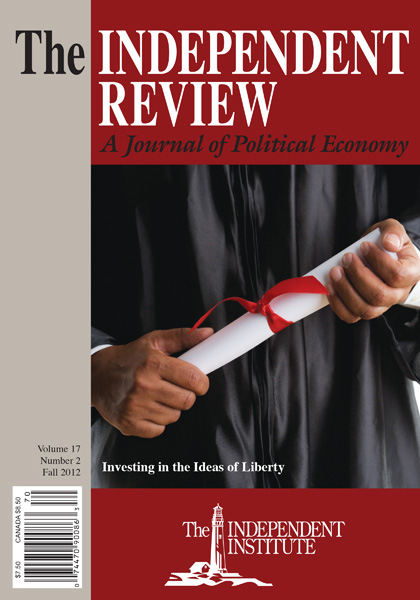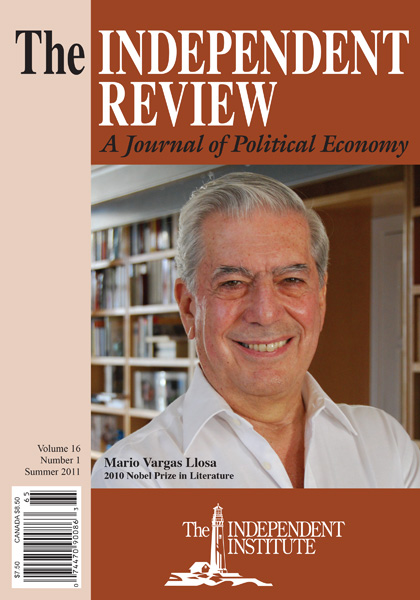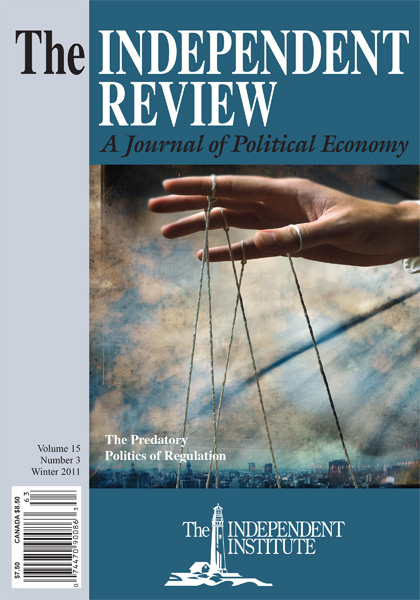This paper won third place in The Independent Review’s 2024 Student Essay Contest.
Introduction
There is a social trend that pretends to democratize the sciences as if they were to be understood by everyone. The fact that people within the social sciences are the very object of scientific analysis and share the same nature with the scientist has led them to think they have a scientifically authoritative voice in the social sciences. Whereas in the fields of physics or chemistry people may be less likely to opine recklessly, in the science of law everyone has something to say. Just like in economics, the fact that people make up part of the studied phenomena leads them to try out some answers to the questions that arose in these scientific realms, which have filled them with methodology.[1] In the science of law, the concept of rights has not been analytically developed and remains a vague concept that people often use without any concrete meaning, or even as a political justification for any sort of state intervention, policy, or coercion.[2]
Economic methodology has been vastly studied and criticized, and through analytical methods economists have provided robust theories about economic phenomena such as prices, money, and markets. The same duty is pending for jurists, who have not yet come to a systematic theoretical framework for the nature of their science. What called for our attention was noting a gap between the political ideal of liberalism, which is said to be based on individual rights, and most of the Hispanic American legal theory, which is mostly focused on rules and norms, even by classical liberal jurists.
Most political economists who allegedly support a free-market system suppose that the market process may work within a set of rules, social norms, and a legal system that presumably operates automatically, apart from the very market process itself.
The present work aims to outline some key points that have been so far little or not at all analyzed, at least in the Latin American legal tradition. We have noted three points that have great relevance and little theoretical development. The first is a theoretical analysis of the nature of legal rights, which we would approach following the analytical tools of praxeology[3]; the second is the features they must have to reach the quality of economic goods;and finally, we make some reflections on the costs of rights, so far taken as costless by most jurists and exclusively as a collective cost[4] by some economists.
Most of the recent liberal legal developments are based on using the Coasean law and economics analytical tools, which assume that the allocation of resources, given zero transaction costs and well-defined property rights, would reach efficiency.[5] Although Coase makes some relevant points, the tradition derived from his work does not pay attention to the nature and features—or the fairness—of those assumedly given property rights.
Another important but insufficient point raised by liberal jurists is the criticism of the so-called social rights,thecornerstone of what has become known as social justice,which features in a large number of political pamphlets, as well as jurisprudence on the nature and content of these “economic, social and cultural rights.” The criticism at this point has been mostly on the economic inconvenience of the welfare state that these politically assigned rights suggest, rather than its very nature. Those who have criticized the nature of social rights have relied mostly on natural law theories that, depending on the method and its philosophical basis, may declare a limited list of rights, conveniently in all cases identical to those proposed by the political ideal of liberalism: life, liberty, and property, or the pursuit of happiness. Nonetheless, there is a key point in the latter’s argument: the distinction between positive and negative liberties, firstly developed as political prescriptions that have not been fully integrated into the legal theory yet.
On the Nature of Rights
We propose to encourage some reflections on what rights are,rather than what (and which) they should be, concerning the legislative and market process. Following an analogue process to Carl Menger’s[6] research on the origins and nature of money, we must determine the essence of the social phenomena studied before we can discuss its accidental features and how they accomplish its function.
Similar to Menger’s construction of the concept of money as a widely accepted means for exchange, rights may be defined as a widely accepted means for keeping and demanding property upon the scarce resources we expect to trade in the market process when we face a conflict upon it through complaining before an obligor or a third party. And that is it. Praxeologically speaking, rights are means and not ends themselves. They are institutions, a social technology, that allow people to manage resources so far as people accept them.[7] Some liberals may be reluctant to accept them as rights whether for their inefficacy or their origins in mere legislation, using Hayekian terminology.
Whether the institutional arrangement that results is considered legitimate and effective or not will determine not the essence but the quality of the right.[8] These rights may be configured in different ways, just as money has been represented by different goods, such as cattle, shells, and metals through time. We may not foresee the specific institution that will be used for the sake of property, which is the duty of legal historians,[9] but we can speculate on what features they may share to accomplish its functions. These fundamental functions of rights are two: ensuring the safety of property itself upon the means men have to reach better states of satisfaction of their needs; and making it possible to foresee and plan human actions ahead of time, in other words, to reduce uncertainty about the future.
Once we have outlined the nature and functions of rights, we may focus our attention on determining which should be the qualities of these rights to be functional for men, and by analogy, fitting them in the category of economic goods, which implies that men may value them.
These qualities are three: first of them is individuality, since only through individual choices can rights-holders express their plain will when making use of their rights. Then we have enforceability, which is the capacity to make a change in the state of affairs to factually reach what that right determines. Last but not least, we have voluntariness, which is equivalent to say plain property upon the right itself. Let us get deeper into this concept in the next section. Most of the legal rights that classical liberals have hardly criticized without a systematic analysis may lack at least one of these three elements.
Property Rights on Rights
Putting rights into the economic category of means, so that they only get to be valued as long as they represent some utility for their holder, implies that every right is at its core a property right.[10] When we talk about real rights, rights in rem, the property right unfolds into ius utendi,the right to use the thing; ius fruendi,the right to receive income from it; and ius abutendi,which is the right to dispose of the thing, whether we want to quit, transfer, or destroy it. A legal theory oriented to private property and the free market must include these features in the individual rights it allegedly supports.
Pierre-Joseph Proudhon,[11] although he was an enemy of private property, pointed out a relevant double meaning of property: 1) properties as intrinsic features that make things unique, in other words, the ontological features that configure its essence; and 2) property as a domain relation existing between men and things they own. However, he decided just to concentrate his efforts on the latter's nature, considering it barren to develop any metaphysic reflection about the former or the relation between both.[12] Indeed he derided any argument of this type, which he tagged as a task for philosophers, not for political economists.
Perhaps Proudhon’s mockeries have discouraged political economists from making any sort of reflections on this, which for us has a significant relevance, not only for political economy but for politics and law theory. We hold that more research on this topic is still needed.
Most countries’ legislatures, and even constitutions, in the last century have declared a large list of nonwaivable rights that respond to two different phenomena. Some of them belong to the first meaning of property, those which are the essential qualities of men, not “nonwaivable” but proper to the nature of man beyond its willingness. The right to identity, gender, or nationality consists of mere administrative qualities that can only acquire economic value (category of economic goods) if when linked to it, men get access to other economic goods (higher values). We can see here how rights get to be economic means.
Conferring a right has both an economic and a political substance.[13] The former consists of the values one can reach by using rights, while the latter is the opportunity to execute rights (enforceability). Politics has tried to fit into this group some positive rights, or positive liberties, which contain an affirmative action that someone else, or the state, may take to fulfill the expectations conferred by the right by alleging that some basic needs are a right derived from intrinsic human dignity. Many liberal thinkers have already pronounced against the fairness and sustainability of these political wills with economic and ethical arguments.[14]
The kind of rights described above are indeed rights, for in some way they give the rights-holders a means to demand something deserved, but most of them lack individuality and often have very little enforceability, so they become “bad quality rights,” as they are mostly useless for the rights-holder and so are little or not at all valued.
But among the negative rights that liberals have correctly identified as “good rights,” there are also some political, legislative, and administrative interventions that divert the functioning of the legal system as a system for protecting rights. Those are the assertions that some features linked to negative rights are “nonwaivable.” A perfect example to illustrate this issue is labor rights. The right to work is indeed a freedom right or negative liberty,[15] a good right. But politics has linked some of these freedom rights to unrefusable affirmative actions, such as, in this case, minimum wages, social security, and so on.
We propose to start some theoretical works on determining to what extent it is logical and economically efficient to confer what we identify as plain property rights on rights, which is, at its core, ius abutendi upon legal rights.
This thesis may lead us to some fruitful advances in legal theory, political philosophy, and economic performance if this model were to be applied. Let us outline some of the possible challenges and questions to be studied.
One issue to be analyzed would be the possible new markets that could arise from this phenomenon. Markets are mostly contract networks. As people would be conferred some new tradeable goods,valued differently by themselves than by other actors in the market, markets could arise, and linked to them the incentives for entrepreneurship to supply new demands to inform, allocate, and coordinate these goods. Conferring ius abutendi on rights would mean a new initial endowment, starting, of course—and at this point we support the classical liberal ideal—from the automatic possession right upon our bodies, minds, and will.[16] We have witnessed how these happen to some extent in informal labor markets, where people contract regardless of the legal contractual types and the nominal unrefusable rights conferred, withdrawing the pretended protection that has no value or utility for them, but high costs.[17] A similar issue arises in arbitration, mediation, and generally all the alternative methods for dispute resolution which are a refusal of the affirmative action of a subsidized dispute resolution method supplied by public traditional courts, but also at its core a disposition upon the individual right to judicial protection. At this point, we could analyze to what extent arbitral clauses are a refusal of the right to judicial protection, and whether it is an essential or accidental feature of rights. This is the kind of question for which we encourage answers.
However, this thesis may also have a great impact on political philosophy, completely aligned with the political ideal of liberalism. As we see it, the unrefusability of rights has been the spearhead of state paternalism, both in economic performance (for instance, the mentioned case of labor rights) and in individual liberties (such as the right to life concerning euthanasia, or drug usage). We may explicitly state at this point that “it might be the case that we both have a right to take a certain action and it is immoral to do it. But that’s the sphere of rights, and that is why the sphere of rights is eliminated from the sphere of morality per se.”[18]
Gratuity of Rights Protection
For rights to be an economic means, just like any other kind of property, the proprietor must look for their value, quality, and maintenance. Mainstream law theorists have assumed that the state may subsidize the attention that the very owners must give to their rights.
At this point, we have identified some instances where our thesis may shed some light on how a free market of legal protection may work. The first could be the alternative methods of dispute resolution, a field where markets have arisen and evolved, with restrictions of course. But that shows how private enterprise could serve for the sake of individual rights based on a decentralized network of self-interested wills.
Another legal issue that could be fruitful to explore through this theory is the phenomenon of usucapion. There is a philosophical question on how time could yield a legal effect that makes unlawful acts lawful. The answer we propose is that it could be found in the costs of looking after private property, just as it has been widely accepted in procedure law, where most of the procedural rights are seen as “burdens” that parties must look after and execute on time if they want to keep the benefits derived from them. Pretending the right to an ex officio protection of rights is pretending an affirmative action, a subsidy.
Finally, financial markets are indeed another great example of flourishing entrepreneurship as they are markets of rights. Commercial law is basically about goods and titles trade. Titles are tradeable rights to own firms, to charge debtors, and so on upon which people have ius abutendi, and market institutions have largely developed tools to rate, keep, and increase their value, trade them, set pledges on them, and take many other actions that increase men’s heritage and let them better seize their assets.
Conclusions
We will not find the concept of subjective rights among Greeks and Romans, for they understood the law as an adequation of things to a certain natural, objective order. As Enrique Ghersi[19] points out, a theory of subjective rights is at the core of the humanist law philosophy. It was not until Grotius that rights happened to be understood as faculties of men rather than features of things. There was also the historical debate between William of Occam as the defender of the Franciscans’ right to refuse property according to their poverty votes and Pope John XXII, who considered rights what is given to someone for the sake of justice according to Ulpian’s concept of it, to render each his own,[20] where the ownership does not respond to a person that holds a right but to that Roman objective, phantasmagoric state of equilibrium.[21]
Studies toward a subjective theory of rights may yield very important outcomes. But as an analytical tool, it may serve jurists to rethink a general theory of law and contracts, as well as to develop some new judging and dispute resolution criteria. For the political economist, his duty within this thesis would be to study and identify how markets, entrepreneurship, and institutions evolve to coordinate and adjust the social process derived from this institutional arrangement and initial endowment. For legislators, it could add some new criteria to the process of making objective, positive laws and regulations beyond the incredibly good but insufficient Coasean and Public Choice analysis.
Notes
[1] It is worthwhile to point out that not even this common belief has encouraged a distinction concerning the different methodologies that must apply to different sciences. People and even some social scientists still try to analogously use physics methods in social studies.
[2] As F. A. Hayek points out in his The Fatal Conceit (Chicago University Press, 1988): “so can these [weasel words] deprive of content any term to which they are prefixed while seemingly leaving them untouched.”
[3] “Praxeology rests on the fundamental axiom that individual human beings act, that is, on the primordial fact that individuals engage in conscious actions toward chosen goals. This concept of action contrasts to purely reflexive, or knee-jerk, behavior, which is not directed toward goals. The praxeological method spins out by verbal deduction the logical implications of that primordial fact.”Murray N. Rothbard, Praxeology: The Methodology of Austrian Economics,in The Foundations of Modern Austrian Economics,ed. by Edwin G. Dolan (Institute for Humane Studies, 1976).
[4] “Politics is a structure of complex exchange among individuals, a structure within which persons seek to secure collectively their own privately defined objectives that cannot be efficiently secured through simple market exchanges.” James M.Buchanan, The Constitution on Economic Policy,p. 50, in Mainline Economics: Six Nobel Lectures in the Tradition of Adam Smith,ed. by Boettke, Haeffele-Balch, and Storr (Mercatus Center, 2023).
[5] Ronald Coase, The Institutional Structure of Production,pp. 71–72, in Mainline Economics.
[6] “All the definitions of money that do nothing more than enumerate, one after another, the external functions and methods of use of money itself, or an arbitrary situation of the same taken from the observation of the commercial traffic of people of modern civilization, ignore the problem of the conceptual development of money and deserve to be considered inaccurate and antihistorical, since they are limited to the observation of its most modern manifestations.”Carl Menger, El dinero (Unión Editorial, 2013).The translation is the author’s.
[7] “Praxeology does not deal with the external world but with man’s conduct with regard to it. . . . [nor] with human actions as they should if all men were inspired by an absolutely valid philosophy and equipped with a perfect knowledge of technology. . . . A means is everything which acting men consider as such.” Ludwig vonMises, Human Action: A Treatise on Economics, 3rd revised ed. (New Haven, Connecticut: Yale University Press, 1966).
[8] “It is money—money that works well or badly, in a healthy or unhealthy way, but money in the end in both cases.”Menger, El dinero.
[9] Menger explicitly noted this difference between the theoretical and historical legal research by highlighting and comparing Gustav Schmoller’s methods on economics to those of Friedrich Carl von Savigny. Schmoller and Savigny were both leaders of the German historical school, the former of economics and the latter of law. Carl Menger, El Método de las Ciencias Sociales, pp. 110–12, especially footnote 11(Unión Editorial, 2006).
[10] “It is impossible to circumvent the need for a theory of ownership. . . . We’re going to be using principles of ownership of property rights to get into a lot of other questions, such as civil liberties, where principles of rights, so-called human rights, and property rights are often seen to be in conflict, many legal theorists taking the view that human rights ought to come before property rights. And, of course, what I shall be trying to defend here is a different view; to wit, that ‘human rights’ can only be defined and fully explicated by seeing them as an exercise of a certain kind of property right.”Roy A. Childs, Property Rights and Civil Liberties: Two Sides of One Coin in Liberty Against Power (Fox & Wilkes, 1994).
[11] Pierre-Joseph Proudhon, What Is Property? (Cambridge University Press, 1876).
[12] “He has, then, the property of the property of being proprietor. How ashamed I should be to notice such foolishness. . . .”Proudhon, What Is Property? The translation is the author’s.
[13] Robert Poole, The Political Obstacles to Privatization,in Privatization and Development,ed. by Steve Hanke (Institute for Contemporary Studies, 1987).
[14] See, for instance, Thomas Sowell’s Social Justice Fallacies.
[15] “We have emphasized the special meaning we have assigned to the term subjectivist freedom. Subjectivist freedom refers not to any institutional arrangements permitting substantive liberties to the individual market participant, but strictly to the absence of determining control over human behavior exercised by external circumstances.” Israel M. Kirzner, The Driving Force of the Market: Essays in Austrian Economics (Routledge, 2000).
[16] Childs, Property Rights and Civil Liberties.
[17] “Since cost is experienced by the decision-maker at the moment of choice, it means that there is no way for outsiders to objectively measure the costs which are relevant to decisions actually made.” E. C. Pasour Jr., Costs and Choice: Austrian vs. Conventional Views,in Champions of Freedom: Austrian Economics: A Reader (Hillsdale College Press, 1991).
[18] Childs, Property Rights and Civil Liberties.
[19] Enrique Ghersi, Derecho y Economía: Estudio Críticos (Pontificia Universidad Católica del Ecuador, 2019).
[20] Dora De Ampuero, “El Derecho de Propiedad: Historia de un Concepto,” Ideas de Libertad no. 2 (Instituto Ecuatoriano de Economía Política, 1993).
[21] Expression taken from Jesús Huerta de Soto’s “The Ethics of Capitalism,”Journal of Markets & Morality 2, no. 2 (fall 1999), 155.




